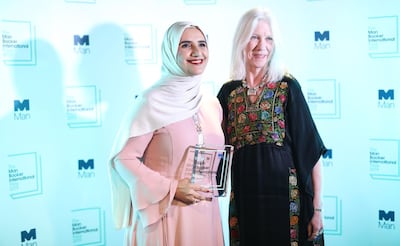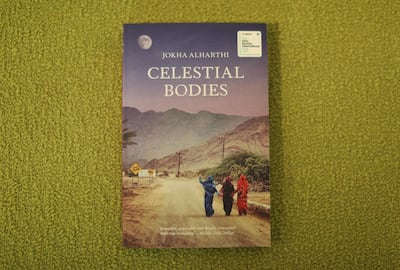Omani author Jokha Alharthi has won the Man Booker International Prize for her novel Celestial Bodies, scooping the £50,000 (Dh233,465) award, which she shares with the translator, American academic Marilyn Booth.
Celestial Bodies, which is set in the Omani village of al-Awafi and orbits around the lives and loves of three sisters, is the first novel originally written in Arabic to win the award.
Chair of the judges Bettany Hughes said: “It avoids every stereotype you might expect in its analysis of gender and race and social distinction and slavery. There are surprises throughout. We fell in love with it.”
Alharthi, 41, now takes her place at literature's top table, with Celestial Bodies destined to become one of this year's most talked-about and widely-read novels (last year's winning author, Olga Tokarczuk, saw sales of her novel, Flights, increase by 692 per cent).
With that in mind, here are five things you may not know about Alharthi.
1. She is the first author from the Arabian Gulf to win this award
Not only that, Alharthi is one of only six Arab authors ever to be nominated for the Man Booker International Prize. Speaking before the announcement, however, Alharthi explained that the characters in Celestial Bodies experience universal feelings of "love, loss, friendship, pain and hope".

“They take on sacrifices and struggles and find joy in writing, or in art, much the same way as anywhere else,” said Alharthi, who grew up in a family of poets and was first published at the age of 19. “This is something the whole world has in common. Omanis, through their writing, invite others to look at Oman with an open mind and heart.”
And the firsts keep coming: Alharthi is also the first Omani author ever to have a novel translated into English.
2. She is the author of two other novels
Celestial Bodies – or Sayyidat al-Qamar – was originally published in 2010 and was Alharthi's second novel, following her 2004 debut, Manamat (Dreams). In 2016, Alharthi's third novel, Narinjah (Bitter Orange), was published and went on to win that year's Sultan Qaboos Award for Culture, Arts and Literature. Celestial Bodies is the only one of Alharthi's novels to be translated into English – so far.
Added to this, Alharthi has written three short-story collections and two children’s books. She was nominated for a Sheikh Zayed Book Award in the “Young Authors” category in 2012.
3. She came up with the idea for Celestial Bodies in… Scotland
Yes, you read that correctly. Alharthi was studying for a PhD in classical Arabic literature at Edinburgh University when inspiration struck.
"The plots and characters were partially in my mind," she said in a recent interview with The National. "But the actual starting point for Celestial Bodies was that I was feeling a little homesick. So I indulged in writing about these people back in Oman."
Celestial Bodies was published by independent Scottish publisher Sandstone Press.
Alharthi has since returned to Oman and now teaches at the Sultan Qaboos University in Muscat.
4. She has not written ‘a road-map to the Arab world’
If you pick up Celestial Bodies hoping to read some kind of "Beginners' Guide" to Arab or Omani culture, you'll be disappointed, says translator Marilyn Booth, who actually helped Alharthi with her thesis at Edinburgh University.
“Too often, Arabic fiction is thought of as a road-map to the Arab world rather than first and foremost as art, as imaginative writing, pushing the boundaries of what can be thought and said,” Booth explained in a recent interview.
“Perhaps what one learns most is how alike they are in their daily [life], human exchange and emotions, and how societies that might appear so different are really so very much alike.”

5. She is currently working on a fourth novel
Not too much is known about Alharthi’s next project but Booth confirmed at the Man Booker International Prize ceremony that she hopes to translate the novel once it has been published – although she hopes that, for her sake at least, there is less poetry in this one.
"One of many rich things about Jokha's work, which also made it very hard at times to translate, is that there's quite a lot of poetry in the novel," said Booth in an interview with Publishing Perspectives.
“But I have to say that as a translator, every time I got to another poem, I’d think, ‘Oh, Jokha, don’t do this to me again.’”


